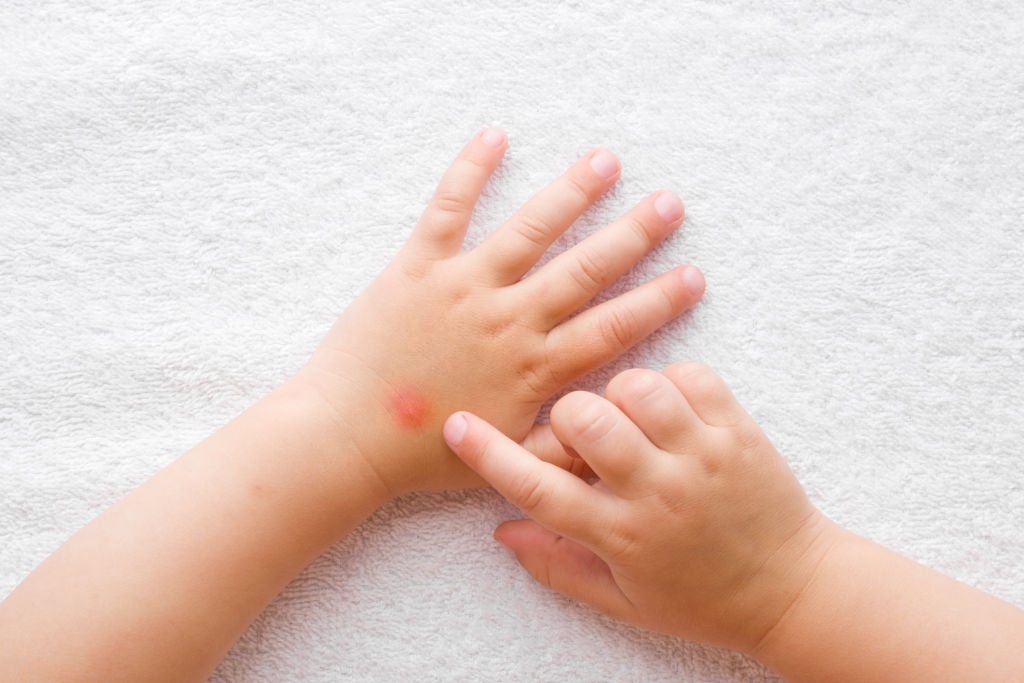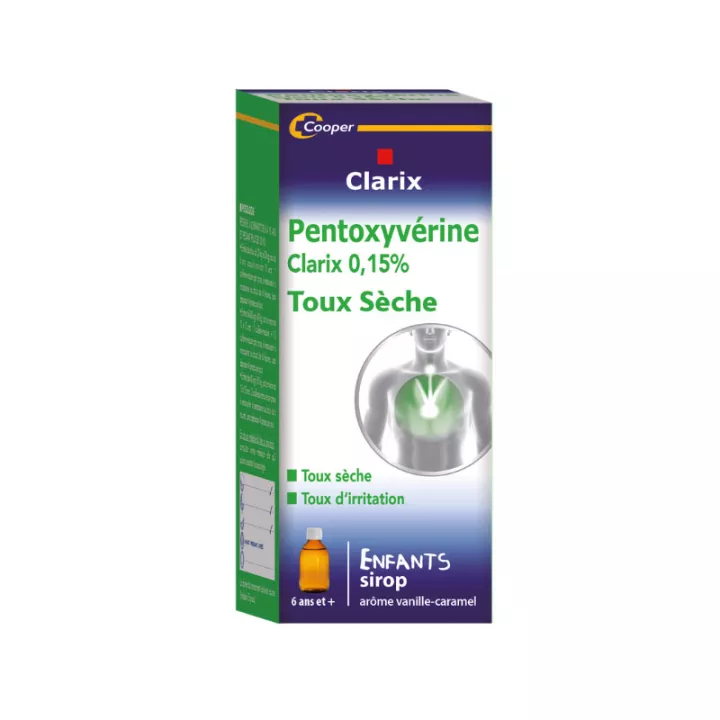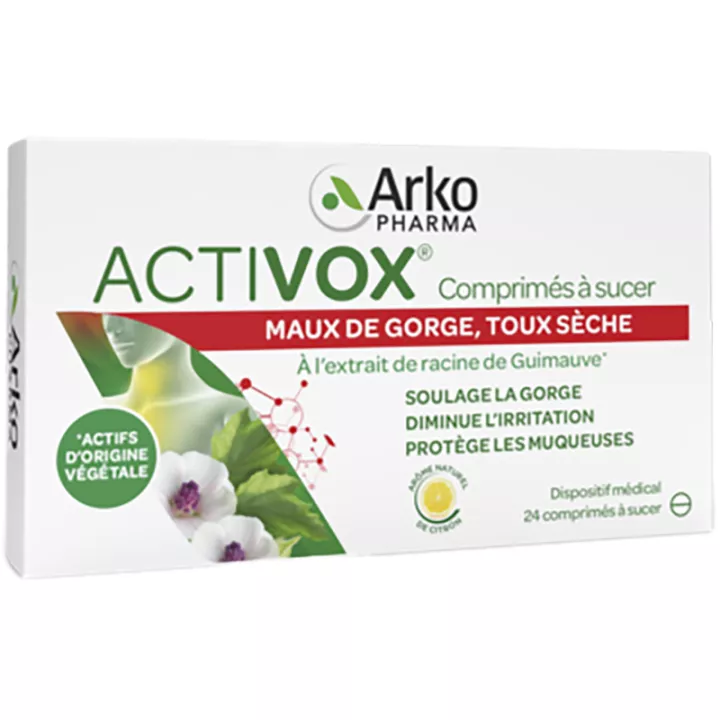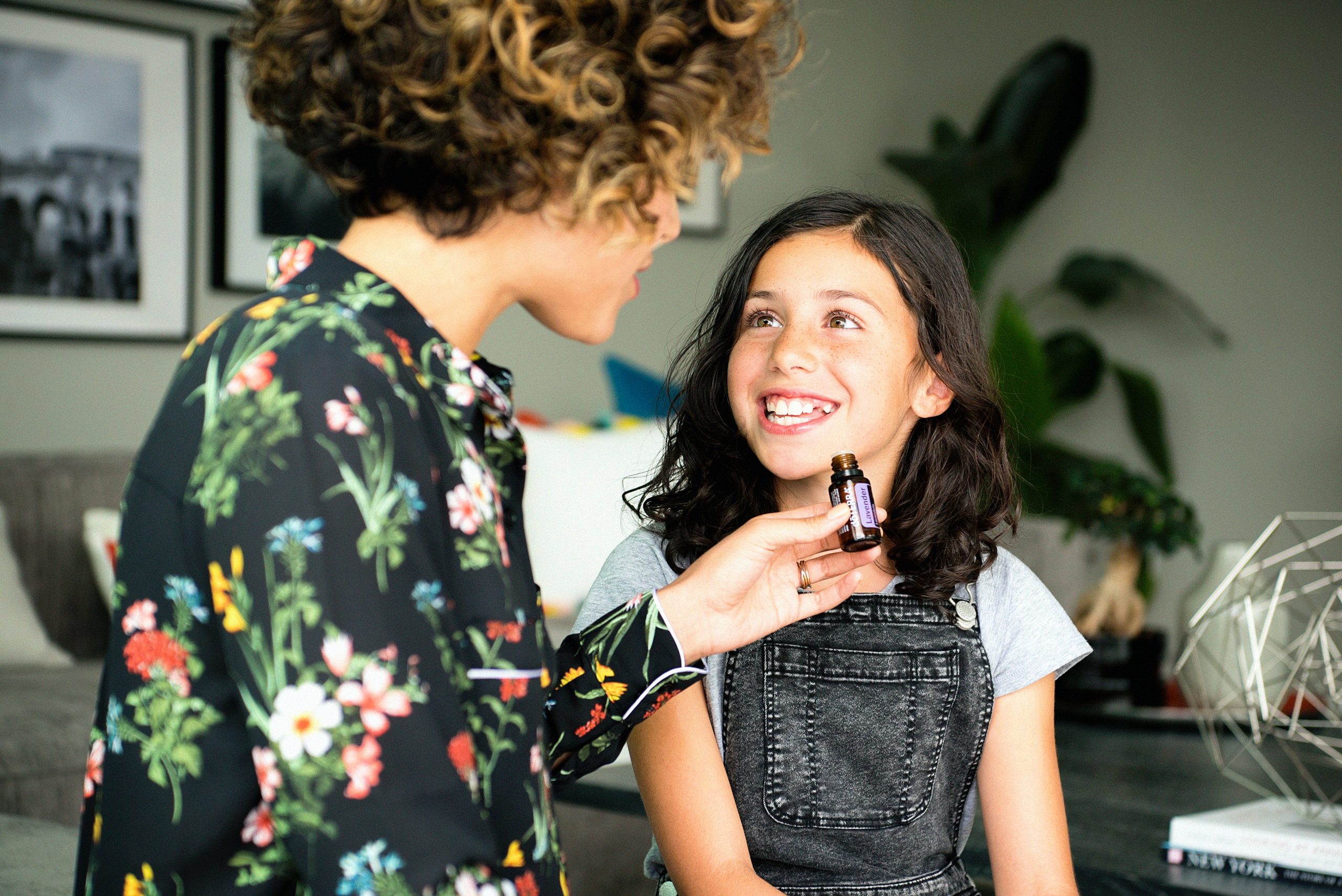NOTICE
ANSM - Last updated: 06/11/2009
Name of the medicinal product
CLARIX DRY CLEANSER PENTOXYVERINE 0,15% CHILDREN, syrup
Pentoxyterin Citrate
framed
· This medication is a specialty of AUTOMEDICATION intended for use without consultation or prescription from a doctor.
· The persistence of the symptoms, the aggravation or the appearance of new disorders, require to take a medical opinion.
· Read the leaflet carefully, and for any precision, as in case of doubt, ask your pharmacist for advice.
Review summary
In this notice :
1. WHAT IS CLARIX DRY COUPLE PENTOXYVERINE 0.15% CHILDREN, SYRUP AND WHAT IT IS USED FOR?
2. BEFORE YOU TAKE CLARIX POULTRY DRINK PENTOXYVERINE 0.15% CHILDREN, syrup?
3. HOW TO TAKE CLARIX DRY COUGH PENTOXYVERINE 0.15% CHILDREN, SYRUP?
4. WHAT ARE POSSIBLE SIDE EFFECTS?
5. HOW TO STORE CLARIX DRY COUGH PENTOXYVERINE 0.15% CHILDREN, syrup?
6. ADDITIONAL INFORMATION
1. WHAT IS CLARIX DRY COUPLE PENTOXYVERINE 0.15% CHILDREN, SYRUP AND WHAT IT IS USED FOR?
Pharmacotherapeutic group
ANTITUSSIVE
(R = respiratory system)
Therapeutic indications
Short-term treatment of dry coughs and irritating cough.
2. BEFORE YOU TAKE CLARIX POULTRY DRINK PENTOXYVERINE 0.15% CHILDREN, syrup?
List of information needed before taking the medication
If your doctor has told you about an intolerance to some sugars, contact your doctor before taking this medicine.
Cons-indications
Do not take CLARIX DRY TOUX PENTOXYVERINE 0.15% CHILDREN, syrup:
THIS MEDICINE MUST NOT BE TAKEN BY YOUR CHILD IF:
· of allergy to one of the constituents, in particular parabens (methyl and propyl parahydroxybenzoate),
· asthma,
· respiratory failure,
· urinary discomfort related to prostate disease,
· risk of glaucoma by closure of the angle.
This medication MUST NOT BE GENERALLY USED unless your doctor advises otherwise during pregnancy.
IN CASE OF DOUBT, YOU MUST REQUEST THE NOTICE OF YOUR DOCTOR OR PHARMACIST.
Precautions for use; special warnings
Take special care with CLARIX TOUX DRY PENTOXYVERINE 0.15% CHILDREN, syrup:
Special warnings
DO NOT LEAVE THIS MEDICINE FOR CHILDREN.
· In the case of chronic (long-term) bronchial or lung disease accompanied by cough with sputum, medical advice is essential.
· Do not use a cough with this medicine. In this case, coughing is a natural defense necessary for the evacuation of bronchial secretions.
· If the cough of your child becomes oily, is accompanied by clutter, sputum, fever, take the advice of your doctor.
· This medicine contains sucrose. Its use is not recommended in patients with intolerance to sucrose (rare hereditary disease).
· This medicinal product contains methyl parahydroxybenzoate (E218) and propyl parahydroxybenzoate (E216) and may cause allergic reactions.
· This medicinal product contains an azo agent, the dye (E151), the dye (E124) and the dye (E102) and may cause allergic reactions.
Use this medication only with caution (precautions for use)
· In the event of a fever, such as worsening or no improvement after 5 days, do not increase the doses beyond what is recommended, do not take another cough supportive jointly, but CONSULT YOUR DOCTOR,
· Do not combine a liquefying medication with bronchial secretions (expectorant, mucolytic) with this antitussive.
· This medicinal product contains 2.8 g of sucrose per 1 teaspoon (5 ml) or 1.4 g of sacharose per 1/2 teaspoon, which must be taken into account in the daily diet in the case of low-sugar diets or diabetes.
Interaction with other medicines
Taking or using other medicines
If you are taking or have recently taken any other medicines, including medicines obtained without a prescription, talk to your doctor or pharmacist.
This medicine contains an antitussive agent, pentoxyterin citrate . Other medicines contain or contain another antitussive. Do not combine them, in order not to exceed the maximum recommended doses |
Interactions with food and beverages
Food and drinks
The consumption of alcoholic beverages should be avoided during the treatment period.
Interactions with Herbal Medicines or Alternative Therapies
Not applicable.
Use during pregnancy and lactation
Pregnancy and breast feeding
If you are pregnant or breastfeeding,
The use of this medication is not recommended during pregnancy and breastfeeding.
Do not take this medicine without consulting your doctor or pharmacist. |
Sport
Not applicable.
Effects on ability to drive or use machines
Driving and using machines
This medication may cause discrete, transient somnolence or dizziness that may be dangerous for vehicle operators and users of certain machines. This phenomenon diminishes after several catches. It may be helpful to start treatment at night.
This phenomenon is accentuated by the consumption of alcoholic beverages.
List of excipients with known effect
Important information about some of the ingredients of CLARIX TOUX SECHE PENTOXYVERINE 0,15% CHILDREN, syrup:
Methyl parahydroxybenzoate (E218), propyl parahydroxybenzoate (E216),
Sucrose (2.8 g per 5 ml measuring spoon or 1.4 g of sacharose per 1/2 measuring spoon),
Dye (E124), dye (E151) and dye (E102).
3. HOW TO TAKE CLARIX DRY COUGH PENTOXYVERINE 0.15% CHILDREN, SYRUP?
Instructions for proper use
Not applicable.
Dosage, Mode and / or route (s) of administration, Frequency of administration and Duration of treatment
Do not use this medication in children less than 6 years of age. |
Dosage
RESERVED FOR THE CHILD FROM 6 TO 15 YEARS AND WEIGHING OVER 20 KG.
· children over 20 kg to 30 kg, from 6 years to about 10 years: 1 measuring spoon per dose, to be renewed if necessary after 6 hours, without exceeding 4 times per day.
· 30 to 40 kg, or about 10 to 13 years: 1 measuring spoon + 1/2 measuring spoon per recipe, to be renewed if necessary after 6 hours, without exceeding 4 per day.
· 40 to 50 kg, ie approximately 13 to 15 years: 2 measures spoon per dose, to be renewed if necessary after 6 hours, without exceeding 4 catches per day.
In case of liver or kidney disease : consult your doctor to adjust the dosage.
The duration of treatment should be short (limited to 5 days).
Treatment should be limited to coughing times, without exceeding prescribed doses.
Method and route of administration
Oral use.
Frequency of Administration
Space the sockets for at least 6 hours
This medication should only be taken when coughing occurs (for example, for a cough that occurs only in the evening, a single dose of this medication may be sufficient).
Duration of treatment
The duration of use is limited to 5 days |
Symptoms and Instructions for Overdose
If you take more CLARIX DRY TOUX PENTOXYVERINE 0.15% CHILDREN, syrup you should:
In case of accidental overdose, STOP TREATMENT AND SEEK YOUR DOCTOR QUICKLY .
Instructions for omission of one or more doses
Not applicable.
Risk of withdrawal syndrome
Not applicable.
4. WHAT ARE POSSIBLE SIDE EFFECTS?
Description of adverse reactions
Like all medicines, CLARIX TOUX DRY PENTOXYVERINE 0.15% CHILDREN, syrup is likely to have undesirable effects, although not everyone is subject to it: Possibility of:
· allergic reactions, especially cutaneous,
· constipation, dry mouth,
· more rarely: somnolence, respiratory discomfort, palpitations, visual disturbances, urinary disorders, confusion,
· due to the presence of parabens (methyl and propyl parahydroxybenzoate), this drug may cause urticaria.
If you notice any side effects not listed in this leaflet, or if any of the side effects gets serious, contact your doctor or pharmacist.
5. HOW TO STORE CLARIX DRY COUGH PENTOXYVERINE 0.15% CHILDREN, syrup?
Keep out of the reach and sight of children.
Expiration date
Do not use CLARIX DRY TOUX PENTOXYVERINE 0.15% CHILDREN, syrup after the expiry date stated on the bottle.
Storage conditions
No special storage conditions.
If necessary, warnings against visible signs of deterioration
Medicines should not be disposed of via wastewater or household waste. Ask your pharmacist what to do with unused medications. These measures will help protect the environment.
6. ADDITIONAL INFORMATION
Full list of active substances and excipients
What does CLARIX DRY TOUX DRY PENTOXYVERINE 0.15% CHILDREN, syrup?
The active substance is:
Pentoxyterin Citrate ............................................... .................................................. .................... 0.15 g
For 100 ml of syrup.
1 measuring spoon (5 ml) contains 7.5 mg of pentoxyterin citrate.
1/2 measuring spoon (2.5 ml) contains 3.75 mg of pentoxyterin citrate.
The other components are:
Sucrose, vanilla / caramel flavor * , methyl parahydroxybenzoate (E218), propyl parahydroxybenzoate (E216), purified water.
*Composition of the vanilla / caramel flavor: vanillin dyes and grapes, cocoa distillates and vanillin dissolved in a mixture of glucose / fructose, ethyl alcohol, water, propylene glycol, dye (E 151), coloring ( E124), dye (E102).
Pharmaceutical form and content
What is CLARIX DRY CLEANSING PANTOXYVERINE 0.15% CHILDREN, syrup and contents of the pack?
This medication is in the form of a syrup. Bottle of 150 ml.
Name and address of the marketing authorization holder and the holder of the manufacturing authorization responsible for the release of the lots, if different
Holder
FRENCH PHARMACEUTICAL COOPERATION
PLACE LUCIEN-AUVERT
77020 MELUN CEDEX
exploiting
FRENCH PHARMACEUTICAL COOPERATION
PLACE LUCIEN AUVERT
77020 MELUN CEDEX
Maker
FRENCH PHARMACEUTICAL COOPERATION
PLACE LUCIEN AUVERT
77020 MELUN CEDEX
or
DELPHARM TOURS
THE BARAUDIERE
37170 CHAMBRAY LES TOURS
Names of the medicinal product in the Member States of the European Economic Area
Not applicable.
Date of approval of the notice
The last date on which this leaflet was approved is {date}.
AMM under exceptional circumstances
Not applicable.
Internet Information
Detailed information on this medicine is available on the Afssaps website (France).
Information for health professionals only
Not applicable.
Other
Not applicable.










